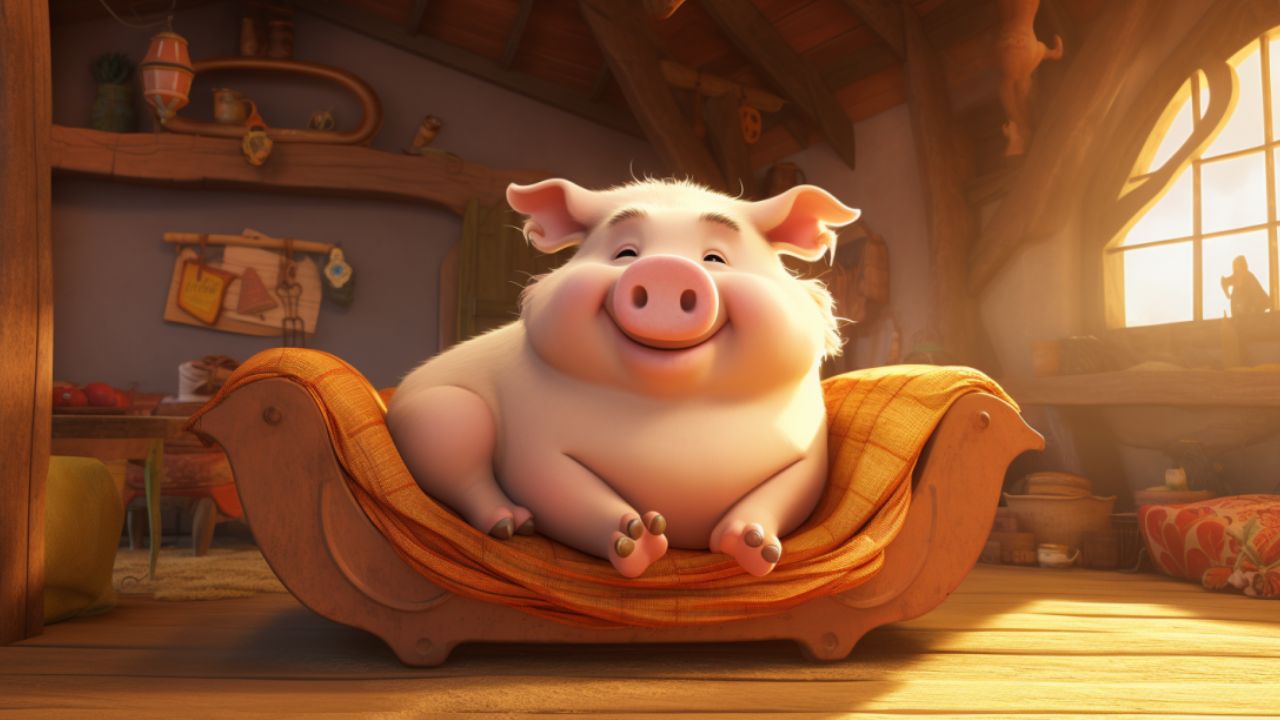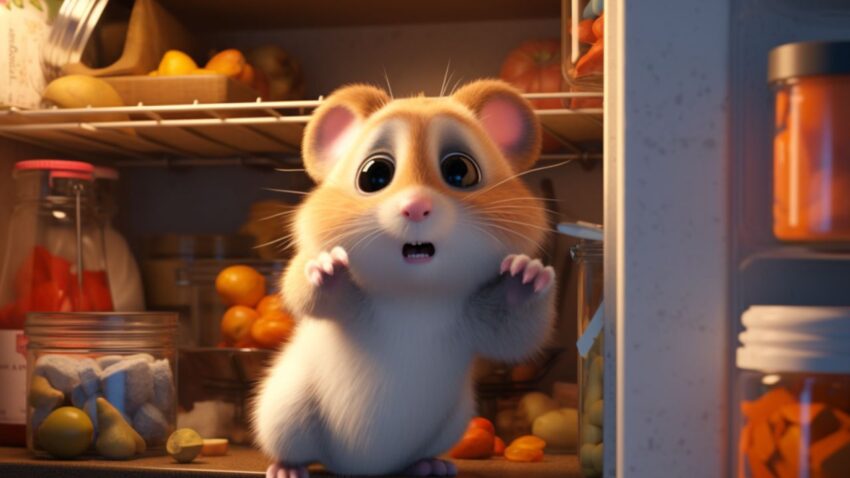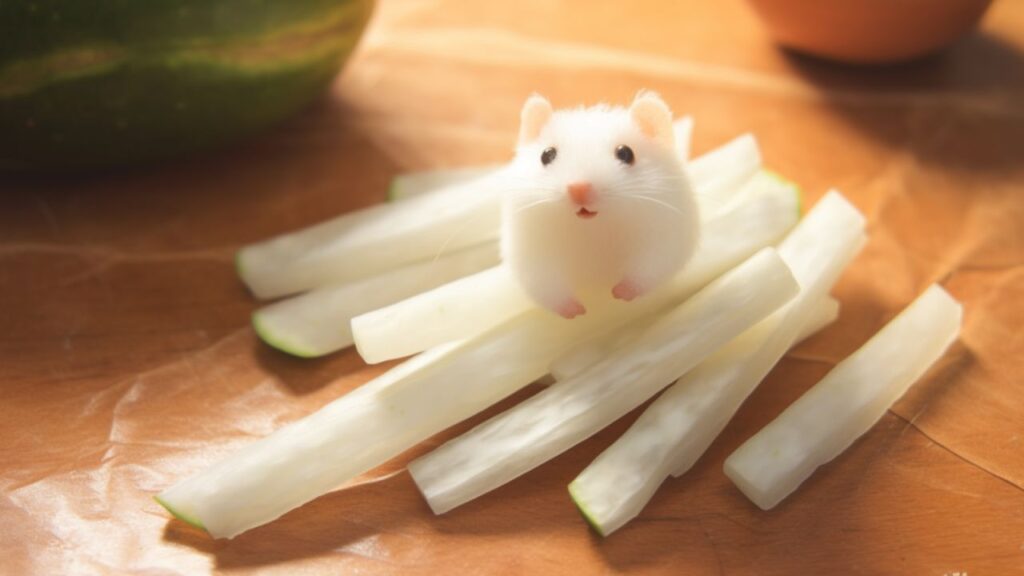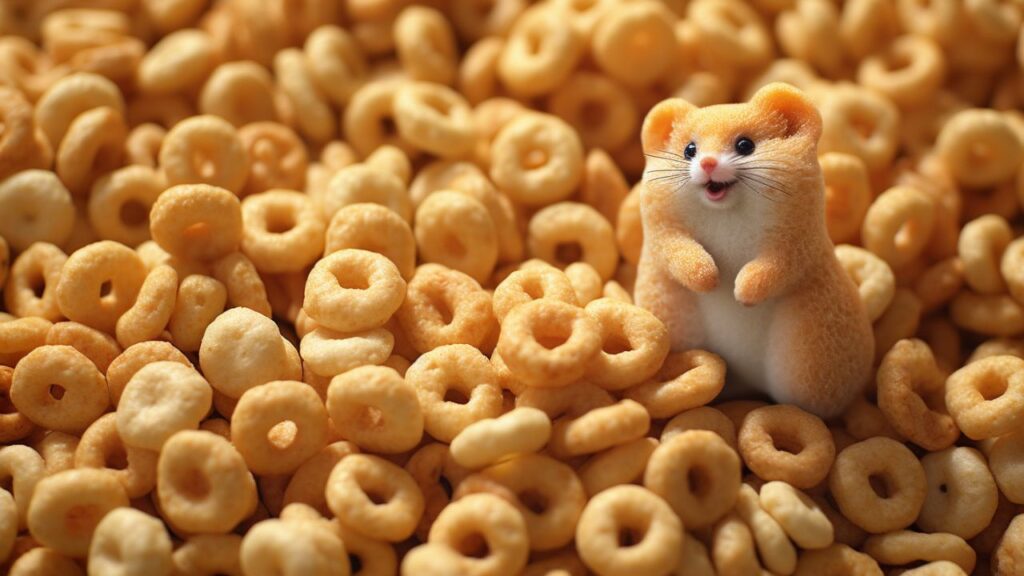TL&DR Summary
In this comprehensive guide, we delved deep into the matter of whether hamsters can safely consume bacon. Through careful analysis of bacon’s nutritional profile and existing scientific literature, alongside personal expertise and community experiences, we found that bacon is not recommended for hamsters due to its high fat and salt content, which can adversely affect a hamster’s health. Although bacon is a popular choice for many humans, it doesn’t align with the dietary needs of a hamster. Responsible pet parenting involves offering your hamster a balanced diet rich in nutrients appropriate for them, ensuring a happy and healthy life. Remember, a happy hamster is a wheel-y happy you!
The Importance of Understanding a Hamster’s Diet
In the wild, hamsters have a varied diet that encompasses grains, seeds, fruits, vegetables, and occasionally, small insects. This diverse palate not only satiates their hunger but also ensures they receive a range of nutrients essential for their well-being. Transitioning this understanding to a domestic setting is a critical task for every hamster parent. It requires a fine balance to ensure your furry friend gets a diet that is both nutritious and safe, aligning closely with their natural dietary preferences.
Understanding a hamster’s diet is not just about knowing what to feed them; it is a deeper exploration into the nuances of their nutritional needs, the right proportions, and the frequency of their meals. Furthermore, it’s about acknowledging that a well-rounded diet plays a pivotal role in ensuring the longevity and happiness of these adorable creatures.
The Hot Topic: Can Hamsters Safely Consume Bacon?
As we delve deeper into the extensive world of hamster diets, one question that seems to pop up often is the safety of feeding hamsters bacon. Bacon, a product derived from pig meat, is known for its high-fat content and savory flavor that many humans can’t resist. However, does it hold the same appeal for our petite pals? Moreover, beyond its tantalizing taste, does it offer any nutritional benefits to hamsters, or could it potentially harbor adverse effects?
In this comprehensive guide, we will explore this topic in great detail, drawing from scientific studies, expert opinions, and my extensive experience as a hamster specialist. Stay tuned as we take a whisker-twitching deep dive into the question: “Can hamsters eat bacon?” and equip you with the knowledge to make informed decisions for your hamster’s diet.
Understanding Bacon

Nutritional Breakdown: What Does Bacon Contain?
Before we can adequately assess whether bacon is suitable for hamsters, we must first take a comprehensive look at what bacon brings to the table, nutrition-wise. Bacon is predominantly derived from the fat-laden parts of a pig, making it high in fat content, particularly saturated fats. Besides fats, it contains a notable amount of protein, which is a crucial nutrient in any diet.
Apart from fats and proteins, bacon also contains varying levels of sodium, thanks to the curing process it undergoes, which often involves salt or brine. This curing process can also introduce nitrates and nitrites, which help in preserving the meat but can raise health concerns due to their associated risks. In addition to these, bacon contains a range of vitamins and minerals, including B-vitamins, phosphorus, and zinc, albeit in smaller proportions compared to its fat and sodium content.
The nutritional profile of bacon can, therefore, be summarized as high in fat, moderate in proteins, and rich in sodium, with a small presence of essential vitamins and minerals.
A Favorite of Many: Why is Bacon Popular?
Bacon enjoys a formidable reputation as a favorite breakfast item and a flavorful addition to a multitude of dishes across different cuisines. Its popularity can largely be attributed to its savory taste and crispy texture, which is a result of its high-fat content that renders a unique flavor when cooked.
Moreover, the ease of cooking and the versatility that bacon offers in culinary arts further fuels its popularity. It can be fried to crispy perfection for a hearty breakfast, used to enhance the flavor of salads and sandwiches, or even wrapped around other meats to impart a rich, smoky flavor. Its potent flavor can elevate a simple dish to something special, making it a staple in many kitchens.
As we venture further, it’s pivotal to keep in mind this popularity perspective from the human viewpoint, as we aim to scrutinize whether what is delightful for humans translates to being safe and nutritious for our hamster friends. Stay tuned as we delve deeper, applying a lens of meticulous analysis to understand if this popular food item finds a place in the dietary regimen of hamsters.
The Scientific Take on Hamsters and Bacon

What Research Says: Existing Scientific Literature on Hamsters Consuming Bacon
Diving headfirst into the world of scientific research and academic articles, we find that the literature on hamsters consuming bacon is somewhat limited. However, we can derive insights from the general consensus on the dietary needs of hamsters and the nutritional composition of bacon, which we discussed in the previous section.
A cornerstone in hamster dietary research is the necessity for a balanced diet that is rich in fiber and includes a variety of nutrients that support the overall health of the hamster. Given bacon’s high-fat and sodium content, it doesn’t align with the recommended dietary profile for hamsters. The high sodium content, particularly, can lead to a series of health complications including obesity and heart-related issues, given the small size and metabolic rate of these creatures.
Moreover, cured meats like bacon can potentially contain harmful substances such as nitrites and nitrates, which are utilized in the preservation process. The potential health risks posed by these substances can be amplified in small bodies like those of hamsters.
Expert Observations: Personal Observations and Case Studies
Drawing from a wealth of experience and countless observations in the field, I can say that feeding bacon to hamsters is not a common practice among seasoned hamster owners and experts. The general guideline leans towards offering hamsters a diet that is rich in grains, vegetables, and fruits, supplemented with a balanced portion of proteins derived from sources like chicken, tofu, or legumes, rather than processed meats which include bacon.
Moreover, in the few instances where hamsters have been observed to consume bits of bacon, the repercussions have mostly been negative, with signs of discomfort and digestive distress appearing quite evidently. It seems the high fat and salt content in bacon does not sit well with the delicate digestive system of hamsters, paving the way for adverse effects on their health in the long run.
Therefore, from a veterinarian standpoint, and with backed scientific understanding, the encouragement leans heavily towards abstaining from including bacon in a hamster’s diet to maintain their optimum health and wellness. It’s always better to err on the side of caution, especially when it comes to the well-being of our petite and delicate furry friends.
Potential Health Implications

The Good and the Bad: Analyzing the Possible Health Impacts of Feeding Bacon to Hamsters
In the vibrant world of hamster parenting, one of the recurrent questions pertains to the dietary choices for these tiny creatures. Bacon, a favorite among many humans, naturally comes under scrutiny. Let’s dissect the possible health implications, dividing them into the ‘good’ and the ‘bad’ to give you a well-rounded perspective on the topic.
The Good
Honestly speaking, it’s quite challenging to pinpoint substantial benefits of feeding bacon to hamsters. However, we could argue that bacon, being a source of proteins and fats, might provide a slight energy boost to your hamster. Proteins are essential for muscle development, and fats can be a source of energy, but these nutrients should ideally come from healthier, more balanced sources to ensure the well-being of your hamster.
Moreover, some might argue that offering a new variety of food could potentially enrich the hamster’s environment, providing a different texture and taste experience, albeit, this comes with considerable caveats which we will discuss in the ‘bad’ section below.
The Bad
Navigating through the unfavorable terrain reveals that the cons substantially outweigh the pros when it comes to feeding bacon to hamsters. Bacon is rich in fats and salt, a combination that can wreak havoc on a hamster’s small body. The high-fat content can lead to obesity, a serious concern given the sedentary lifestyle of domestic hamsters.
Furthermore, the high sodium content in bacon could potentially elevate the risk of high blood pressure and heart diseases in the long term. The fact that bacon is a processed meat also introduces the risk of harmful substances, such as preservatives and additives that are used in the curing process, entering the hamster’s system, posing serious health risks including cancer.
The digestive system of hamsters is designed to process a diet rich in grains, fruits, and vegetables, a diet that is high in fiber and nutrients. Introducing bacon, which is low in fiber and high in fats, can cause digestive distress, disrupting the delicate balance of their digestive system and potentially leading to discomfort and illnesses.
In light of the above analysis, it becomes evident that the potential negative impacts of feeding bacon to hamsters far outweigh the scant benefits, steering us towards advising against including bacon in your hamster’s diet for the sake of their health and happiness.
Whisker Tips

Navigating the fascinating journey of hamster parenthood comes with its share of queries and concerns. Though I firmly advocate for a bacon-free diet for your little furball, I am here to provide guidance in case you opt to tread this path. Let’s jump into the indispensable Whisker Tips, a treasure trove of insights and safe practices.
If You Choose to Proceed: Tips on How, If at All, Bacon Can Be Introduced in a Hamster’s Diet
Embarking on this route requires a cautious and informed approach. If you choose to introduce bacon into your hamster’s diet, it must be done very sparingly. Here’s how:
- Quality Matters: Always opt for high-quality, organic bacon to reduce exposure to harmful additives.
- Tiny Portions: Remember, hamsters are tiny creatures with equally tiny dietary requirements. A minuscule amount, no larger than a grain of rice, should suffice for a single serving.
- Less is More: Make it an occasional treat, not a regular part of their diet. Once a month is more than enough to avoid health complications.
- Cook it Well: Ensure the bacon is well-cooked to kill any bacteria and reduce the risk of foodborne illnesses.
- No Seasonings: Steer clear of seasoned or flavored bacon, as spices and added flavors can be harmful to hamsters.
Safety Measures: Ensuring the Well-being of Your Hamster
Ensuring your little one’s safety is the paramount concern. Below are safety measures to heed:
- Monitor Their Response: Always monitor your hamster’s reaction after trying any new food, including bacon. Keep an eye out for signs of distress or illness.
- Consult a Veterinarian: Before making any significant changes to your hamster’s diet, it’s wise to consult with a veterinarian for personalized advice.
- Nutritionally Balanced Diet: Maintain a balanced diet that primarily consists of hamster-friendly foods to ensure they receive the necessary nutrients for optimal health.
- Hygiene is Key: Always ensure that the feeding area is clean to prevent bacterial infections.
- Emergency Response: Be prepared to respond quickly in case of any adverse reactions, having an emergency vet contact is essential.
By adhering to the above guidelines, you take steps towards safeguarding your hamster’s health while exploring new dietary avenues. Remember, when in doubt, always prioritize your hamster’s well-being over experimentation.
Alternative Viewpoints and Community Voices

As a responsible hamster parent, one should always explore diverse perspectives before making an informed decision. The world of hamster enthusiasts is broad and varied, harboring a range of opinions and experiences. Let’s delve into what other experts and hamster parents have to say about incorporating bacon into a hamster’s diet.
What Other Experts Say: Gathering Differing Opinions from Other Experts in the Field
In the vast sea of knowledge, you will find a divergence in expert opinions regarding the inclusion of bacon in a hamster’s diet. Here’s what some are saying:
- Veterinarians’ Input: Many veterinarians voice strong reservations against offering bacon to hamsters, emphasizing the high fat and salt content, which is fundamentally unsuitable for a hamster’s dietary needs.
- Nutritionists’ Advice: Nutritionists often stress the importance of a balanced diet rich in fiber, which is found in fruits, vegetables, and grains, rather than in processed meats like bacon.
- Experienced Breeders: While some breeders might experiment with different diets, the consensus largely remains to avoid foods high in fats and salts to maintain the hamster’s health in the long run.
Hamster Parents Speak: Insights from the Experiences of Hamster Owners
Hamster owners, a passionate bunch, have firsthand experiences and invaluable insights to share. Here’s a compilation of their voices:
- Community Forums: In online forums and social media groups, many hamster parents share their hesitation or outright refusal to offer bacon due to potential health risks.
- Success Stories: Though very rare, you might stumble upon a story or two where a hamster has seemingly enjoyed a tiny bacon treat without immediate adverse effects. It is, however, a path less traveled and not generally recommended.
- Personal Observations: Several hamster owners note behavioral and physical changes in their pets when they experimented with feeding them bacon, leading them to cease its inclusion in the diet promptly.
- Anecdotal Experiences: Stories circulate of hamsters having varied reactions to bacon, with some illustrating negative health impacts over time, reinforcing the standpoint to treat it as a no-go area in a hamster’s diet.
In this section, my goal has been to furnish you with a comprehensive outlook, drawing from a range of viewpoints to aid you in cultivating a deep and rounded comprehension before determining the dietary pathway for your little furball. Leveraging the collective insights of both the expert and pet parent communities is a steadfast way to navigate these decisions with wisdom and care.
FAQs

Clarifying Doubts
In this section, we dive head-first into the swirling pool of questions and doubts that surround the subject of feeding bacon to hamsters. From new hamster parents to seasoned hamster enthusiasts, everyone has questions, and it is my mission to provide answers grounded in scientific evidence and years of experience in the field. Let’s navigate through the most frequently asked questions pertaining to hamsters and bacon:
- Can hamsters safely consume bacon?While bacon is not toxic to hamsters, it is high in fat and salt, which can lead to obesity and other health issues when consumed in large quantities. It is recommended to offer bacon in very small amounts if at all, and always prioritize their primary diet which should consist mainly of hamster pellets and a variety of fruits and vegetables.
- How often can I feed bacon to my hamster?Given the high fat and salt content in bacon, it is advised to keep it as a rare treat. Ideally, it should be offered not more than once a month in tiny portions to prevent any adverse health effects.
- Are there any preparation methods to make bacon safer for hamsters?If you choose to offer bacon to your hamster, ensure it is cooked thoroughly to eliminate any potential pathogens. Also, try to opt for a low-sodium variant and remove any visible fat to make it a bit safer for your pet. However, the best practice remains to limit or avoid bacon in your hamster’s diet.
- What are the potential health risks of feeding bacon to hamsters?Consistent consumption of bacon can lead to obesity due to high-fat content and may even introduce a risk of heart diseases. The high salt content can also lead to increased blood pressure and kidney issues. Therefore, it is best to exercise caution and restraint when it comes to introducing bacon into your hamster’s diet.
- Are there alternatives to bacon that I can offer my hamster?Absolutely, there are numerous healthier alternatives to bacon that you can offer your hamster. Consider giving them small amounts of vegetables, fruits, and hamster-safe seeds and nuts. Always introduce new foods gradually and in moderation to observe any adverse reactions.
Remember, when in doubt, always consult with a veterinarian to understand what is best for your furry little companion. Stay curious and stay informed to ensure the well-being of your hamster.
Closing Thoughts

Summarizing the Findings
As we round off this comprehensive delve into the world of hamsters and their dietary relationship with bacon, it is pertinent to recall the major touchstones we have covered in this discussion. We embarked on this journey with an overview of the dietary needs of hamsters, setting a clear backdrop to properly address the hot-button issue at hand.
Following this, we ventured into understanding the composition of bacon, acknowledging why it holds a favored position in many diets, albeit primarily human ones. Our journey through the scientific literature and personal case studies then offered a grounded perspective on the implications of introducing bacon into a hamster’s diet, allowing us to weigh the potential benefits and drawbacks succinctly.
Our explorative path also led us through varied viewpoints, drawing from the wealth of experiences and knowledge harbored by fellow experts and hamster enthusiasts in the community. This myriad of perspectives, coupled with answers to some of the most burning questions in the FAQ section, serves to offer you a rounded view on the topic.
Responsible Pet Parenting
As a committed pet parent, it falls upon your shoulders to make informed and responsible decisions for your little furball. In the world of pet care, knowledge is indeed power, and it empowers you to forge a path of well-being and happiness for your hamster. While the temptation to share a treat as beloved as bacon with your pet can be high, it is paramount to prioritize their health and longevity over momentary delights.
Bearing in mind the rich tapestry of insights woven through this discussion, it is encouraged to approach the idea of feeding bacon to your hamster with a spirit of caution and awareness. Let this article serve as a compass guiding you to make choices rooted in knowledge and empathy, always with the well-being of your adorable companion at heart.
Remember that every choice you make echoes in the overall health and happiness of your hamster. A well-nourished hamster is a happy hamster, paving the way for a fulfilling and joyous companionship. Let us all strive to be the best hamster parents we can be, nurturing our pets with love, care, and responsible feeding habits.
Whisker Wisdom Wrap-Up

Final Note
As we reach the end of our gastronomic journey exploring the potentials and pitfalls of including bacon in our hamster’s diet, it is imperative that each one of us takes a mindful approach to caring for our little friends. Remember that every choice we make impacts their well-being and overall happiness.
Understanding their dietary needs is a step toward nurturing a healthier and happier life for them. Always be ready to consult with fellow hamster enthusiasts and experts to gather a pool of knowledge, fostering a community that thrives on shared wisdom and love for these delightful creatures.
Signature Phrase
As I always say, our furry friends bring unparalleled joy and brightness into our lives. Let us remain steadfast in our commitment to providing them with the best, because a nourished and happy hamster translates to a vibrant and joyful environment at home.
Remember, a happy hamster is a wheel-y happy you!
Till our next delightful discussion, stay curious, stay caring, and most importantly, keep those wheels spinning with joy and love for your precious little one.




